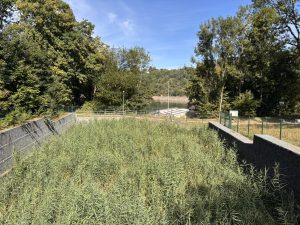About
Micropollutants (MPs) in water bodies, such as pharmaceuticals and industrial chemicals, are drawing increased attention due to their persistence and potential harm to aquatic ecosystems and human health. Their ineffective removal by conventional wastewater treatment systems leads to their accumulation in water bodies, potentially disrupting aquatic ecosystems and impacting the well-being, behaviour, reproduction, and survival of aquatic organisms, eventually entering the food chain. Recognising the environmental threat of MPs, the EU’s revised urban wastewater directive (Council Directive 91/271/EEC) now requires a minimum of 80% removal from wastewater treatment plants (WWTPs) for MPs like pesticides and pharmaceuticals. Common post-treatment options, such as activated carbon or ozone-oxidation, demand considerable energy and fossil materials, thus, to reduce energy and carbon footprint, it is essential to opt for sustainable, eco-friendly solutions to advanced treatment, mitigating municipal and industrial wastewater pollution while restoring aquatic biodiversity. Constructed wetlands (CWs) offer a man-made eco-friendly solution that simultaneously employs biodegradation, sorption, photodegradation, and phytoremediation of MPs and other pollutants. Thus, WeTreat envisions innovation through the optimization of phytoremediation systems that employ plant elite ecotypes of wetland plants and associated rhizo-microbiome on the integration of CWs for resource recovery and the ongoing refinement of wetland-based solutions in urban environments, emphasizing public awareness and policy development to manage MPs effectively. This contributes to sustainable solutions and multi-disciplinary approaches to enhance water quality and protect ecosystems, public health, and the environment.
Organisation and Partners
- Automation & Robotics Research Group
- Department of Engineering
- Faculty of Science, Technology and Medicine (FSTM)
- Centro de Ciencias do Mar do Algarve (Portugal)
- Wageningen University & Research (Nederlands)
- University of Pisa (Italy)

Project team
-
Silvia VENDITTI
-
Henry BERAL
-
Joachim HANSEN
-
Maria Rodrigues
Centro de Ciencias do Mar do Algarve (Portugal)
-
Dr. Thomas Wagner
Wageningen University & Research
-
Prof. Lorenzo Guglielminetti
University of Pisa (Italy)
Keywords
- plants
- phytoremediation
- constructed wetlands
- micropollutants
